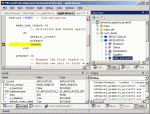I thought it was a shame that the guy was laughing at what sad bastards we are that we can’t even clean up his mess (for 3 months).
For future reference, here’s how you do it (only works in Windows NT/2000, for Windows 95, 98, use a DOS utility like ‘elim’):
dir /x
The /x switch shows short and long file names. All of the illegal folders had legible short file names. The first one was ~0200, where 20 is actually hexadecimal for 32, which is ‘space’ in ASCII.
Once you know the folder name,... [More]



 Another exciting product announcement at the Apple Developer’s Conference is
Another exciting product announcement at the Apple Developer’s Conference is